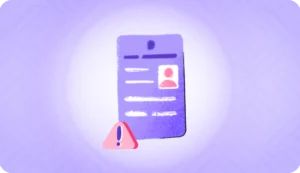The Federal Trade Commission estimates that over $750 million have been stolen through identity fraud. Identity fraud involves the theft and misuse of a person’s existing bank accounts, other financial resources, and Personally Identifiable Information (PII). Identity fraud includes, for instance, illegally acquiring your account details with the goal of stealing money or discovering your personal information through a data breach.
In addition to data breaches, fraud and hacking are other ways that criminals can get their hands on your data. Scams like phishing and social engineering frequently get victims to send their personal information to criminals via email or websites.
It’s also important to keep in mind that identity fraud impacts corporations all across the world in addition to individuals and can have long-lasting effects. This is due to the possibility of severe fines and other consequences if a business permits someone to conduct a fraudulent transaction and does not comply with know your customer (KYC) regulations.
Difference between Identity Theft and Identity Fraud
You could contend that the definition of “identity theft” implies that it transpires when someone steals your identity. And when they use your identity to defraud someone or act illegally, that is called “identity fraud.” However, the phrases “identity theft” and “identity fraud” are now used interchangeably.
Identity fraud is the use of this stolen information, whereas identity theft is the act of stealing personal, confidential, or financial information.
When criminals have access to the private information of others, what types of crimes can they commit? As it turns out, all kinds of them. Although there are many identity frauds and identity theft crimes, the Federal Trade Commission categorizes them as follows:
Identity Fraud Crimes:
- Credit card fraud- Using a stolen credit card or credit card number to make unauthorized transactions.
- Employment or tax-related fraud- Using stolen personal information to gain employment or file an income tax return.
- Phone or utility fraud- Using stolen personal information to unlock open cell phones or utility bills.
- Bank fraud- Using stolen personal information to gain access to financial accounts.
- Loan or lease fraud- Using someone else’s information to obtain a lease or loan.
- Government documents- Using someone else’s information to obtain government benefits.
Identity Theft Crimes:
- Robbery- Stealing someone else’s wallet to access their data.
- Post Interception- Intercepting someone else’s post by claiming it as yours.
- False Identity- Contacting a potential victim while claiming to be with a reliable organization.
Different types of Identity Fraud
Most people erroneously believe that all kinds of identity fraud are alike. This isn’t the case, though, since ID fraud comes in many forms and occurs quite often. Below is a list of the most widespread fraudulent and malicious activities:
- Financial identity fraud
The most prevalent type of identity theft is financial identity fraud. It transpires when someone uses someone else’s information for financial gain. A fraudster might, for instance, use someone else’s bank account or credit card to steal money or purchase something.
- Medical identity fraud
Identity fraud in the healthcare industry is also on the rise. The theft of a person’s personal information to receive healthcare in their place is known as medical identity fraud.
- Criminal identity fraud
Criminal identity fraud occurs when someone who has been convicted provides your information to law enforcement officials.
- Synthetic identity fraud
One of the fastest-growing financial crimes is synthetic identity fraud. It occurs when a fraudster fabricates an identity using both false and accurate facts. It is also closely related to document tampering, which is the act of altering the physical attributes of an official document.
- Child identity fraud
Another prevalent and serious crime is child identity fraud. Naturally, the majority of kids under the age of 16 do not have credit reports. In other words, it’s feasible for a fraudster to open a credit account in a child’s name and for it to go unreported for years. It’s not uncommon for a child identity fraud victim to discover the crime when they apply for employment or a student loan.
Ways to prevent Identity Fraud
Identity fraud is definitely on the rise, and both individuals and businesses are at risk. But how can you beat identity fraud and protect your company from this mounting risk? The practices listed below can help you prevent identity fraud attacks:
- Understand your legal and regulatory obligations inside and out
Your firm’s location and purpose will define what regulatory and legal obligations it has. It’s critical that you fully understand anti-money laundering (AML) and know your customer (KYC) requirements if you’re subject to them. This will not only guarantee that you are in compliance but will also give you more knowledge about potential criminal victims of your company.
- Know your vendors and customers
Even if you are exempt from strict KYC requirements, you should still make sure you are aware of who your customers are. By doing this, it will be much easier for you to identify any business request or transaction that seems off for that client or supplier and might be fraudulent.
- Identify loopholes
You can evaluate your processes and systems to minimize risk by considering the potential targets of fraudsters. To further mitigate vulnerabilities, you should constantly assess and upgrade the systems you use.
- Get professional guidance
As a last thought, consider taking advice from an expert or legal counsel to keep you informed and educated. Making preparations for the worst-case situation will help you make sure your company is well-prepared to fight fraud. Hyperverge’s secure identity verification software can aid you and your company in preventing any malicious activities.
Ways to Identify Theft Fraud
Warning flags that indicate you may have been a target of ID fraud:
- You’re missing mail or unanticipated mail is arriving in your mailbox.
- Your private papers have been misplaced or taken.
- There is a mistake on your credit report,
- You have noticed strange behavior on your bank and credit card statements.
- You’re receiving ominous calls, messages, emails, or voicemails.
- Your digital accounts have been accessed by unfamiliar devices.
Identity verification software
Businesses everywhere are obligated to prevent fraud and confirm the legitimacy of their customers.
Fortunately, identity verification software can make the procedure swift, easy, and reliable. An identity verification software will enable your company to:
- Recognize fraudulent and manipulated IDs
- Retrieving and validating document data
- Ensure adherence to know your customer (KYC) and anti-money laundering (AML) regulations
- Improve users’ ability to verify their identities
Identity fraud can be stopped in its tracks with the aid of Hyperverge’s reliable identity verification services. They continue to be reliable and hassle-free by introducing passive liveness detection devices.
How to report an Identity Theft Fraud
Identitytheft.gov serves as a central hub for reporting and information about identity fraud. Make a recovery plan by starting with that website, which is administered by the Federal Trade Commission, and follow its suggested procedures. The police, the post office, and credit bureaus may all need to be contacted as well. On its website, the IRS offers a taxpayer guide to identity fraud and has a phone number for identity fraud at 800-908-4490.
If your credit card was lost, stolen, or fraudulently used, you can also contact the organization that issued it. Contact your health insurance and consider getting in touch with any connected providers if it seems like someone else utilized your health benefit to make sure your medical history hasn’t been combined with anyone else’s.
What happens when you report an Identity Fraud
By reporting identity fraud, you can begin the investigation and your reputation-restoration process. Depending on the type of identity fraud, specific steps may be required.
You can usually get replacement credit cards with a different number from the credit card companies, and resume using your card. Identity fraud involving taxpayers or the fraud of benefits is often resolved more slowly.
Regardless of the identity theft you face, take detailed notes during phone calls and save all correspondence.
Postscript
The adoption of identity fraud protection services notifies you when your confidential data has been misused or when it is in danger due to data breaches. They can also assist you in repairing the damage and reclaiming your identity if you are a victim of identity fraud, and they might even reimburse your expenses.
At Hyperverge, we recognize that every company is different and has specific requirements. We thus provide specialized digital identity verification services that are tailored to your company. Our proprietary AI models enable us to adapt quickly. Add personalized AI checks as new needs are recognized since they are designed to operate in real-time even in low bandwidth conditions and on low-end devices. Discover a cutting-edge solution that matches your demands by scheduling a free demo today.
FAQs
What is identity theft?
Identity theft is a crime in which an assailant obtains personal or sensitive information from a victim using fraud or deception and then makes use of it to act in the victim’s identity.
What is the most common type of ID fraud?
Financial Identity Theft.
What are the 4 types of identity theft fraud?
Financial, medical, criminal, and child identity fraud.
Can someone steal your identity with your phone number?
Yes! Scammers can access your SMS, applications, and other online accounts using stolen cell phone numbers to obtain two-factor authentication codes.





